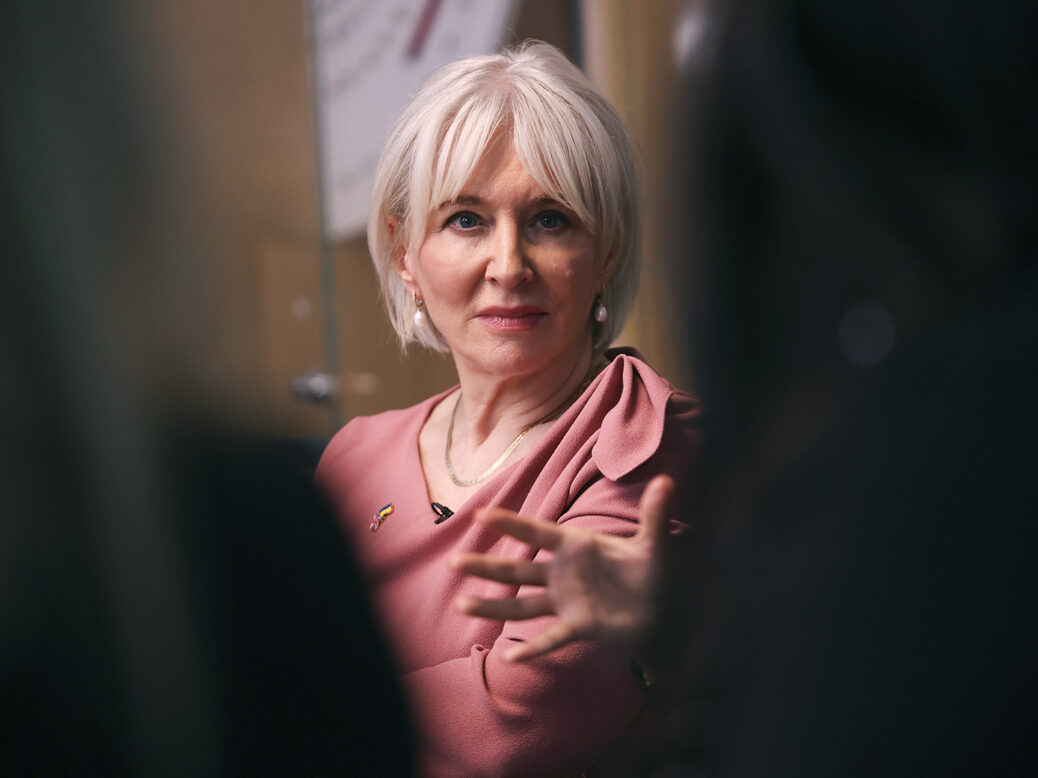
Conservative culture secretary after Conservative culture secretary has mooted selling off Channel 4, only to drop the plan entirely. Given the party has privatised no shortage of services over the years, this suggests that the prospect is not entirely straightforward.
Nadine Dorries, the latest officeholder, has once again announced that she intends to privatise the channel. She wrote last night (4 April) that government ownership “is holding Channel 4 back from competing against streaming giants like Netflix and Amazon”.
That tweet alone, unless Dorries was abducted and forced to write it at gunpoint, is something of a problem for the Culture Secretary. It suggests a fundamental misunderstanding of not only Channel 4, but also the broadcasting sector, business, capitalism and Conservatism. Other than that, it’s a great idea.
To unpick what is happening, let’s start with some basic facts about Channel 4, at least some of which Dorries was unaware of at a recent select committee hearing. Channel 4 is publicly owned, but it receives no public funding – it covers its own costs through advertising and commercial partnerships.
Unless you pay for ad-free streaming on All4 (£3.99 a month), Channel 4 costs you £0 a month – vs £7.99 for Disney+, £13.25 for the BBC’s multiple TV and radio channels (via the licence fee), and £15.99 a month for Netflix’s most expensive plans.
Channel 4 has a requirement to reach diverse audiences – including young and BAME viewers – not reached by other free-to-air channels, and is also banned under its founding charter from making any of its own programmes. Any original content it commissions must be made by independent, private-sector production houses.
As a result, it has invested more than £12bn in the independent production sector, and supports more than 10,000 jobs, works with more small independent companies than its larger rival ITV, and is efficiently run – the BBC makes £228,000 in revenue per employee, ITV makes £443,000, while Channel 4 receives just over £1m in revenue per staffer.
The broadcaster was founded by that most radical of leftists, Margaret Thatcher – partly as a bid to show that a public broadcaster could succeed without licence fee revenue, and partly to jump-start private-sector TV production.
On the latter front it succeeded wildly: there is a reason that leading global TV and movie productions, backed by Amazon, Netflix and the like, come to the UK – and Channel 4 jump-started that world-leading British economic sector. The channel’s movie arm, Film4, often provided early funding to independent cinema that encouraged commercial investors to come on board. Film4-backed movies now have more than 35 Oscars between them.
Privatising Channel 4, with all of its public service restrictions on output and production, would mean it raised almost no money. Removing those restrictions would likely harm the independent TV sector that is currently thriving, and still raise a pittance in government finance terms.
As a result, the private TV production sector doesn’t want a privatised Channel 4. Neither do advertisers, who would find it harder to reach Channel 4’s distinctive audience as a result, and who would dislike less competition in the market – as the channel would inevitably be purchased by an international conglomerate.
Privatising Channel 4 would, therefore, be tinkering with an efficiently run, publicly owned business that acts to kickstart the private sector. It would be unpopular in the sector, raise little revenue, and dismantle part of Thatcher’s legacy – government interference in a perfectly successful enterprise is, in many ways, the opposite of Conservatism.
As for competing with Netflix or Amazon, that is simply not on the cards for Channel 4: the BBC, the UK’s largest broadcaster, spends around $5bn a year on content, more than Channel 4 could dream of. Amazon, meanwhile, spends $10bn, Netflix spends $15bn and Disney spends $30bn.
Nadine Dorries is trying to push through a policy she doesn’t understand, on a brief she doesn’t understand, at the same time as she’s pushing through extraordinary new powers to regulate the internet (that she also doesn’t seem to understand but will discuss with celebrities anyway).
It’s bad business practice, bad politics and bad Conservatism. It is hard not to wonder whether the government is simply moving on Channel 4 because it doesn’t like the people who like the channel – trashing Conservatism to own the libs is the kind of vandalism that Dorries’s party used to threaten to lock up “yobbos” for. Will it let the Culture Secretary’s smash and grab proceed?
[See also: Is Nadine Dorries a free speech champion or censorship fanatic?]



